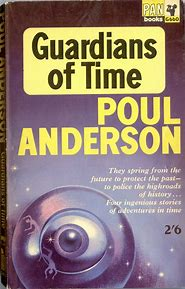"Lights flamed against a hectic sky; the streets crawled with automobiles and a hurrying, faceless crowd..."
-Poul Anderson, "Time Patrol" IN Anderson, Time Patrol (Riverdale, NY, 2010), pp. 1-53 AT 3, p. 17.
He knows that:
"...the towers of Manhattan...reared arrogant toward the clouds."
-ibid.
He reflects that:
"And it was all one swirl on a river that swept from the peaceful prehuman landscape where he had been to the unimaginable Danellian future. How many billions and trillions of human creatures lived, laughed, wept, worked, hoped, and died in its currents!
"Well..."
-ibid., pp. 17-18.
A long time later in his career, and fifty two years earlier in history, Everard reflects:
"History. The stream of events, great and small, running from cavemen to the Danellians. But what about the eddies, the bubbles, the insignificant little individuals and happenings that are also soon forgotten, whose being or nonbeing makes no difference to the course of the stream?"
-Poul Anderson, The Shield of Time (New York, 1991), PART TWO, 1902 A. D., 120.
Of course, a river or stream takes time to flow so time itself is not a river or stream. However, time as a river remains a powerful image. In "Time Patrol," the river sweeps from the prehuman landscape to the Danellian future and human beings live in its currents. In The Shield of Time, the stream runs from cavemen to Danellians with individuals as its eddies or bubbles.
From space, it is possible to observe the entire length of the Mississippi, the Thames or the Nile from its source to the sea. However, a photograph records only a single instant of the river's flow. Everard is contemplating all the instants as if they were an entire length. From that perspective, there is no flow. However, as soon as he travels to 464 A.D. or to 209 B.C., Everard is caught up in the course of events, the currents of the river, and becomes one of the eddies or bubbles. We can experience events, then read about them. A Time Patrolman can read, then experience.

1 comment:
Kaor, Paul!
And that last paragraph seems a bit ironic, when applied to Patrol agents!
Ad astra! Sean
Post a Comment